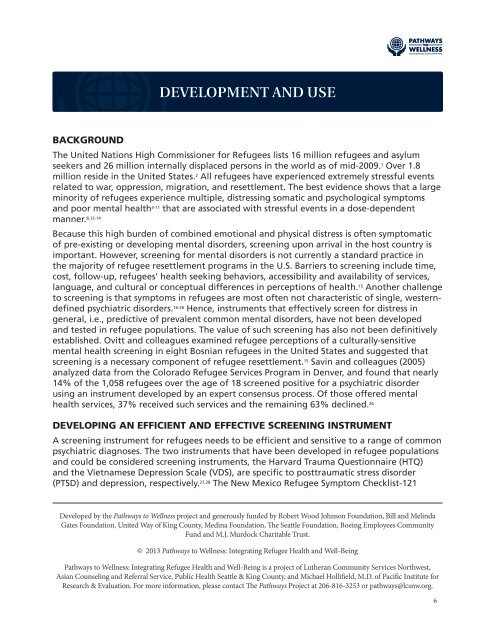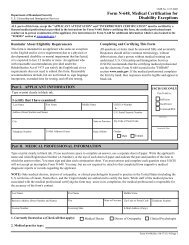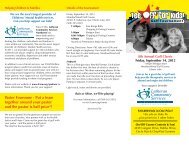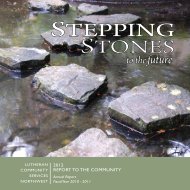to download the Refugee Health Screener Tool - Lutheran ...
to download the Refugee Health Screener Tool - Lutheran ...
to download the Refugee Health Screener Tool - Lutheran ...
Create successful ePaper yourself
Turn your PDF publications into a flip-book with our unique Google optimized e-Paper software.
DEVELOPMENT AND USE<br />
BACKGROUND<br />
The United Nations High Commissioner for <strong>Refugee</strong>s lists 16 million refugees and asylum<br />
seekers and 26 million internally displaced persons in <strong>the</strong> world as of mid-2009. 1 Over 1.8<br />
million reside in <strong>the</strong> United States. 2 All refugees have experienced extremely stressful events<br />
related <strong>to</strong> war, oppression, migration, and resettlement. The best evidence shows that a large<br />
minority of refugees experience multiple, distressing somatic and psychological symp<strong>to</strong>ms<br />
and poor mental health 3-11 that are associated with stressful events in a dose-dependent<br />
manner. 8,12-14<br />
Because this high burden of combined emotional and physical distress is often symp<strong>to</strong>matic<br />
of pre-existing or developing mental disorders, screening upon arrival in <strong>the</strong> host country is<br />
important. However, screening for mental disorders is not currently a standard practice in<br />
<strong>the</strong> majority of refugee resettlement programs in <strong>the</strong> U.S. Barriers <strong>to</strong> screening include time,<br />
cost, follow-up, refugees’ health seeking behaviors, accessibility and availability of services,<br />
language, and cultural or conceptual differences in perceptions of health. 15 Ano<strong>the</strong>r challenge<br />
<strong>to</strong> screening is that symp<strong>to</strong>ms in refugees are most often not characteristic of single, westerndefined<br />
psychiatric disorders. 16-26 Hence, instruments that effectively screen for distress in<br />
general, i.e., predictive of prevalent common mental disorders, have not been developed<br />
and tested in refugee populations. The value of such screening has also not been definitively<br />
established. Ovitt and colleagues examined refugee perceptions of a culturally-sensitive<br />
mental health screening in eight Bosnian refugees in <strong>the</strong> United States and suggested that<br />
screening is a necessary component of refugee resettlement. 15 Savin and colleagues (2005)<br />
analyzed data from <strong>the</strong> Colorado <strong>Refugee</strong> Services Program in Denver, and found that nearly<br />
14% of <strong>the</strong> 1,058 refugees over <strong>the</strong> age of 18 screened positive for a psychiatric disorder<br />
using an instrument developed by an expert consensus process. Of those offered mental<br />
health services, 37% received such services and <strong>the</strong> remaining 63% declined. 26<br />
DEVELOPING AN EFFICIENT AND EFFECTIVE SCREENING INSTRUMENT<br />
A screening instrument for refugees needs <strong>to</strong> be efficient and sensitive <strong>to</strong> a range of common<br />
psychiatric diagnoses. The two instruments that have been developed in refugee populations<br />
and could be considered screening instruments, <strong>the</strong> Harvard Trauma Questionnaire (HTQ)<br />
and <strong>the</strong> Vietnamese Depression Scale (VDS), are specific <strong>to</strong> posttraumatic stress disorder<br />
(PTSD) and depression, respectively. 27,28 The New Mexico <strong>Refugee</strong> Symp<strong>to</strong>m Checklist-121<br />
Developed by <strong>the</strong> Pathways <strong>to</strong> Wellness project and generously funded by Robert Wood Johnson Foundation, Bill and Melinda<br />
Gates Foundation, United Way of King County, Medina Foundation, The Seattle Foundation, Boeing Employees Community<br />
Fund and M.J. Murdock Charitable Trust.<br />
© 2013 Pathways <strong>to</strong> Wellness: Integrating <strong>Refugee</strong> <strong>Health</strong> and Well-Being<br />
Pathways <strong>to</strong> Wellness: Integrating <strong>Refugee</strong> <strong>Health</strong> and Well-Being is a project of Lu<strong>the</strong>ran Community Services Northwest,<br />
Asian Counseling and Referral Service, Public <strong>Health</strong> Seattle & King County, and Michael Hollifield, M.D. of Pacific Institute for<br />
Research & Evaluation. For more information, please contact The Pathways Project at 206-816-3253 or pathways@lcsnw.org.<br />
6





